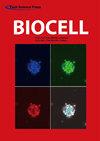Possible therapeutic role of short-chain fatty acids from skin commensal bacteria in UVB-induced skin carcinogenesis
IF 1
4区 生物学
Q4 BIOLOGY
引用次数: 0
Abstract
Solar ultraviolet B (UVB) radiation is a major skin cancer-causing agent. Initiation, promotion, and progression are the diverse phases of UVB-induced carcinogenesis. Exposure to UVB causes abnormalities in a series of biochemical and molecular pathways: thymine dimer formation, DNA damage, oxidative stress, inflammatory responses, and altered cell signaling, eventually resulting in tumor formation. The increased skin cancer rates urge researchers to develop more efficient drugs, but synthetic chemotherapeutic drugs have more contrary effects and drug resistance issues, which have been reported recently. The current review focuses on the relationship between microbes and cancer. Human skin acts as a barrier against the external environment and serves as a protective shield for its inhabitant microbiota, collectively called skin microbes. The gut microbiome plays a vital role in cancer therapy. Production of short-chain fatty acids (SCFAs) such as butyrate, acetate, and propionate by intestinal microbes has anti-cancer properties against various cancer cell lines. Yet, the knowledge of SCFAs produced by skin microbes remains yet to be elucidated exhaustively. In this review, we strive to summarize the findings of studies performed to date regarding the anti-cancer properties of SCFA against various cancer cell lines and provide insight into future directions in the skin microbiome field.来自皮肤共生菌的短链脂肪酸在uvb诱导的皮肤癌发生中的可能治疗作用
太阳紫外线B (UVB)辐射是一种主要的皮肤癌致癌物。起始、促进和进展是uvb诱导癌变的不同阶段。暴露于UVB会导致一系列生化和分子途径的异常:胸腺嘧啶二聚体的形成、DNA损伤、氧化应激、炎症反应和细胞信号改变,最终导致肿瘤的形成。皮肤癌发病率的增加促使研究人员开发更有效的药物,但合成化疗药物有更多的副作用和耐药性问题,这是最近报道的。目前的综述主要集中在微生物与癌症之间的关系。人体皮肤是抵御外部环境的屏障,是居住在皮肤上的微生物群(统称为皮肤微生物)的保护罩。肠道微生物群在癌症治疗中起着至关重要的作用。肠道微生物产生的短链脂肪酸(SCFAs),如丁酸盐、醋酸盐和丙酸盐,对各种癌细胞系具有抗癌特性。然而,皮肤微生物产生的SCFAs的知识仍有待详尽地阐明。在这篇综述中,我们努力总结迄今为止关于SCFA对各种癌细胞系的抗癌特性的研究结果,并为皮肤微生物组领域的未来发展方向提供见解。
本文章由计算机程序翻译,如有差异,请以英文原文为准。
求助全文
约1分钟内获得全文
求助全文
来源期刊

Biocell
生物-生物学
CiteScore
1.50
自引率
16.70%
发文量
259
审稿时长
>12 weeks
期刊介绍:
BIOCELL welcomes Research articles and Review papers on structure, function and macromolecular organization of cells and cell components, focusing on cellular dynamics, motility and differentiation, particularly if related to cellular biochemistry, molecular biology, immunology, neurobiology, and on the suborganismal and organismal aspects of Vertebrate Reproduction and Development, Invertebrate Biology and Plant Biology.
 求助内容:
求助内容: 应助结果提醒方式:
应助结果提醒方式:


